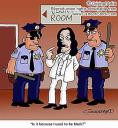Racism vs Culturism.
I’ve visited 42 countries in the last 10 years, and I’ve noted their cultures and customs are all very different indeed. An act that is seen as polite in one culture (slurping soup in Japan), will almost certainly offend people here in Spain. Even the many individual island cultures of the pacific are all quite unique from each other.
Cultures are different, by their very definition. Whether you like it or not. Anyone who has travelled outside their own country has surely witnessed that. But it just so happens, that most cultures are divided by geographical barriers – country borders.
It’s generally fair to say that the majority of Japanese people are very reliable & puncutal. Likewise, if I were to say that Tongan people are very friendly, stress-free & relaxed, that comment would also be acceptable to most people. Why are these statements accepted? Because they’re positive cultural observations.
I’ve noticed that the real problem arises when you make a generalised negative comment about a particular culture. What if I said, for example, Tongan people don’t respect time and are usually running late. Or that Japanese people aren’t very flexible with their appointments?Yes now I’m being totally critical of both countries, by comparing them directly to each other. Even though these statements are for the most part very true indeed, I’m likely to be called a racist! Anyone who calls me a racist for making such statements has not been to both countries to witness the differences in culture with their own eyes. Essentially, they’re completely ignorant, which is probably worse in today’s age of information…
I’ve also noticed that people living in multicultural societies such as Australia, USA and the UK are particularly vunerable to these sorts of «you’re a racist!» comments. Is it a fair assessment? No. I think the confusion stems from my use of the word «people».
In the case of Tonga and Japan, I’m talking about the culture of people, not the race of people. To clarify this point, I’m certain that if a Japanese born person was raised their entire life in Tonga, they’d behave almost 100% like a person of Tongan decsent, because of their cultural upbringing (let’s ignore for the moment that they may be the victim of racsist comments by other Tongan people), despite the fact that they are of Japanese decsent. So obviously it is not fair to label all races the same, if only because some people can be raised in different cultural environments. Don’t be too quick to label someone racist!
Now before I get into trouble, I’ll explain my definitions of races and cultures further. A culture is defined by the peculiar customs and traditions of a particular group of people. Sometimes a culture is aldo definied by it’s religion (rightly or wrongly).
Normally, citizens are defined by the country in which they were born and inhabited. I am Australian, because I was born and raised there. So people are defined by their country of origin. But what actually defines a country? Is it their constitution, or is it their geographical borders? Take a look at any political atlas, and you’ll see many clearly defined borders separtating individual countries. The border between France and Italy is a good example, or that of USA and Mexico. Some «borders» are hazy, ill-defined or often disputed. But for the most part, it’s easier to delineate certain geographical locations on a map of the world than it is to recognise all their many individual principles of foundation or whatever. Cross the hypothetical line and you’re in another country, another culture, and most likely, another race of people. These borders are essentially what divide entire cultures.
Some cultures closely resemble others. Australia and New Zealand are in fact quite similar, whether we both like it or not (probably that’s why we have a go at each other so much, because we’re actually more alike than we’d like). Take again my extreme examples of two island countries: Japan and Tonga. Both can be considered very «intact» cultures, very isolated from outside influences because they don’t share any borders with anyone. But there are also more cultural regions and borders than there are countries! Both Japan and Tonga have seperate islands and states, represented by different cultural traits, local laws, goverment policies, etc.
A race is defined by your bloodline. In otherwords, your genetics and hence your general appearance. For example, the scandinavian race of people are usually very fair. Most Chinese people have black hair. Most people of African decent have dark skin, etc. Naturally there are exceptions, such as albino chinese people. Let’s just say you can’t change the colour of your skin (forget Michael Jackson for a moment). You can’t swap your DNA for someone else’s.
I should point out that to label an entire race is most definitely racist, whether it be a positive or a negative comment. If a black basketball player says «white men can’t jump», that’s a racist comment. Or if I said: the «African American olympians can run faster over 100m than their Caucasian counterparts», that’s still very racist, regardless of whether it is true or false. I don’t know. Perhaps if you did a study of 100,000 American Citizens, you might find that the average African American can in fact run faster than the average Caucasian person, but I think you’d need to look more closely at the many cultural reasons for the result. Like for example the tertiary education gap, employment and wage levels, rates of imprisonment, fast-food eating habits, exposure to regular exercise, ultimately leading to a gap in fitness level of the two races. That kind of result (were it to be thoroughly researched, and found to be correct) is not because one race is physically or mentally superior to another. On some accounts, that’s the real definition of racism. Believing that one race is superior to another, not tolerating another race or discriminating against it.
However, people shouldn’t use the word race and culture interchangeably. They’re most definitely not the same thing! Perhaps 99% of people living in Japan are of Japanese decent, and 98% of people living in Tonga are of Tongan decent -OK so I don’t know the exact numbers of Japanese people living in Tonga (and vice versa)- I could look into it, but to be blunt, I don’t have the time or energy. My point is, people tend to make generalised statements about entire countries, if only because it’s easier to ignore the minority race. When you say that all Tongans are lazy or all Japanese are sticklers, you’re forgetting about Mr Yamada Hanako San who grew up living his entire life in Nuku’alofa. But can I please be forgiven for making interesting cultural comparisons?
Cultures are very different & at the same time very strong indeed, because people are brought up in their specific environments, and that behaviour over-rides any racial personality traits they’ve inherited. Realise that it’s almost impossible to expect people to «unlearn» the traditions, customs & expectations of an environment in which they were brought up in. What a boring world it would be if everyone belonged to the same homogeneous culture.
[poll=4]






Dear Cyclist,
I too have travelled much. I have written a book entitled Culturism. It hopes that the word will be a non-toxic discussion starting alternative to racism and an antidote to Multiculturalism.
Go to http://www.culturism.us for more and e-mail me with thoughts!
John
I agree with all that’s said by the cyclist in Spain. But would further add that if I choose to say that I don’t like black people or I don’t like the yellow ones – or the white ones come to that, then that’s just a statement of my internal condition and one I am entitled to have and mention. If asked to defend that position I might say that I’m not prepared to accept that anything I think and say must be defended or I may tell you to bog off. Or I may launch into a protracted monologue defending any individual to have any opinion he or she likes. I may make some unintelligent observation that in the UK most criminal activity reported that involves violence seems to be committed by the imported races. From that I may even suggest that our government is acting in a criminal fashion by importing said races in sufficient numbers to threaten the delicate fabric of our nations racial identity. And that it does so because of its toothless and insular nature when it comes to making real and proper decisions.
I’m not a member of any party, let alone the BNP. But I sometimes think I should read more of what the BNP have to say. It may make sense.
Everyone is of course entitled to their own opinions. Even though I don’t necessarily agree with what you say, I’ve accepted your comments, and you’ve raised at least one interesting point.
One of the most eye-opening things to happen to me was to live in another country as an ‘expatriate’. In reality, I am nothing more than an immigrant. Some people say that I took a step backwards when I moved from Australia to Spain, because the latter country is not so ‘advanced’.
Anyway, there’s several things that I’d like to point out about your observations:
It might be true that majority of reported criminal activity is committed by imported races. There are times when it certainly seems that way in Australia. But the whole point of this post is to put yourself in their place of someone else.
Assuming for a moment it is true, I have to ask the obvious question why is it so? And here, I feel that if you can’t look beyond the colour of someone’s skin, then you won’t find the answer. Are these races more prone to violence in their own mother country? Possibly. Then you’d have to look at a multitude of factors for the reasons for that, such as the standard of living & police tolerance in their home country, etc.
But I think the case of immigrant violence has a lot to do with being transplanted from your original community.
Have a look at the post I wrote on the Social Readjustment Rating Scale (SRRS). It clearly shows that major life incidents (like moving to another country for example) produce more stress & anxiety in an individual. A greater level of anxiety might also be linked to increased rates of violence.
Violence is another topic entirely. For example, last week the petrol prices rose in Spain, and there was an enormous truck strike. But instead of protesting normally 6 peacefully, it turned into a really ugly warzone-like scene. Why?
I don’t think it has anything to do with the oil crisis. I think it has to do with what Alvin Toffler wrote about in his book «Future Shock». In other words, society is facing a crisis, put simply, because of too much complexity in this world, which we are not accustomed to cope with.
And in that sense, what can be worse than moving from a developing country to a relatively advanced one, in a single step? That’s a big jump forward in anyone’s book. I’m not sure anyone has the right to lay blame for it.